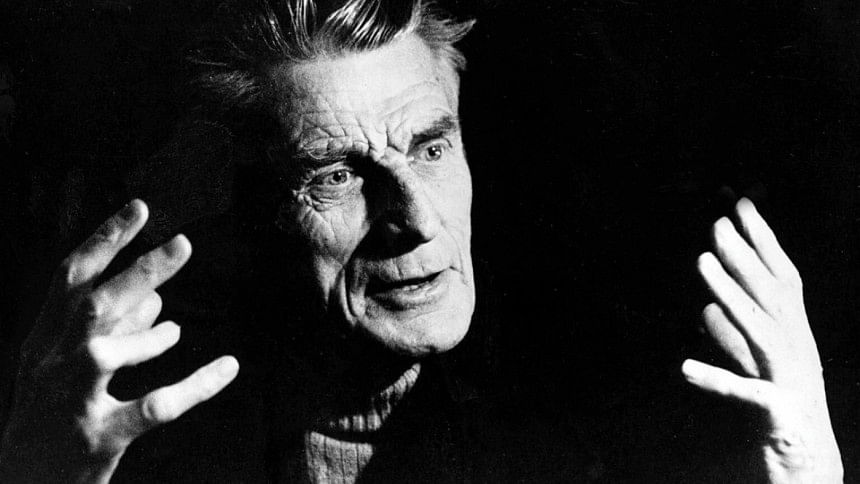Only a woman can cope and go down singing

When we think of Beckett's theatre, the images that come to mind are bodies in pain, immobilised, paralysed, trapped or incomplete, observed William McEvoy in an online article titled An introduction to Happy Days, published in the webpage Discovering Literature: 20th Century in 2017. Amalgamation of pain, immobilization, paralysis, trap or incompleteness is almost a recurring theme in Samuel Beckett's plays. They appear in different shapes and forms in Waiting for Godot, Endgame, Krapp's Last Tape and Happy Days—just to mention the ones we are mostly familiar with. His props are almost routinely wheelchairs, hollow barrels, mounds and the likes that immediately create an ambiance of human disabilities and dull imprisonent. Perhaps, that is the reason why Beckett has no storyline continuum to work with, though he has apparently disjointed, yet unique messages to deliver. This style of Beckett was termed controversially as; we all are aware, theatre of the absurd, by the Hungarian-born British producer, dramatist, journalist, adaptor and translator, critic, academic scholar and professor of drama, Martin Julius Esslin, in 1962. Some of our theatre scholars in Bangladesh too have reservations about that coinage of Martin, though an off-beat trend of writing absurd plays ensued worldwide during the mid-20th century.
After exactly thirty-one years of its premiering in Paris, Waiting for Godot was brought on Bangladeshi stage by Nagorik Natya Sampradaya, in 1984, under the direction of Ataur Rahman and incredibly enough, this so-called absurd play instantly got the audience acclaim—thanks to Professor Kabir Chowdhury for his one-off translation of so communicably difficult play. Credit is also due to Ataur Rahman for his being able to convince his theater group and the cast to produce such a play and that too, so successfully. No second Beckett play has been performed in Bangladesh since then, although almost four decades have elapsed, and intriguingly enough, many other groups are still performing this one and only Beckett play in Bangladesh.
But then, after thirty-four years under the auspices of the Embassy of France in Bangladesh along with the cultural wing of the Alliance Francaise, Dhaka, the second Samuel Beckett play, Happy Days came to our stage on February 01, 2019—an adoringly collaborative endeavor between the Alliance Francaise Dhaka, and the Bangladesh Shilpokala Academy in particular, I must admit! Thanks also to Hrithmancho and Monipuri Theatre for their concerted contributions to the production. Though the play is claimed to be the Bangla translated version by Professor Kabir Chowdhury, it has been edited and adapted by Shubhashis Sinha and Jyoti Sinha, and there lies their effort of theatrical distinctiveness. Shubhashis and Jyoti paired in many other mind-winning productions previously, and the one that I lovingly reminisce is Kohe Birangona. So, they do have something special to offer to the audience and this time too, there was no exception. The play had a frequent blend of code switching and mixing between English and Bangla and what impressed me most was Jyoti's ease of projecting the code-mixed dialogues together with her befittingly theatrical feat. Her confident and unaffected English pronunciation added an extra aura to her performance, though at times, her Bangla was touched by her English utterances.
On the whole, it was a well-directed and well-performed mono-play—and we all know mono-plays are not easy to perform, neither linguistically nor theatrically, as they are prone to becoming tiresome and dreary from both sides; audience and the actor. It becomes doubly so if it is Beckett! Profuse praise to two Sinhas, especially Jyoti, for not making it mind-numbing and being able to hold audience interest till the end, and perhaps Beckett was right when he commented on his Happy Days, 'And I thought who would cope with that [life of the modern woman] and go down singing, only a woman.' Jyoti acted, danced and sang with the music (music had a dynamic role to play) vibrantly enough throughout the play to give a convincingly visual portrayal to the playwright's subtly creative imaginations!
The writer is an educationist teaching English Language & Literature at Central Women's University. He is also a Bangla Academy awardee for translation.

 For all latest news, follow The Daily Star's Google News channel.
For all latest news, follow The Daily Star's Google News channel. 



Comments